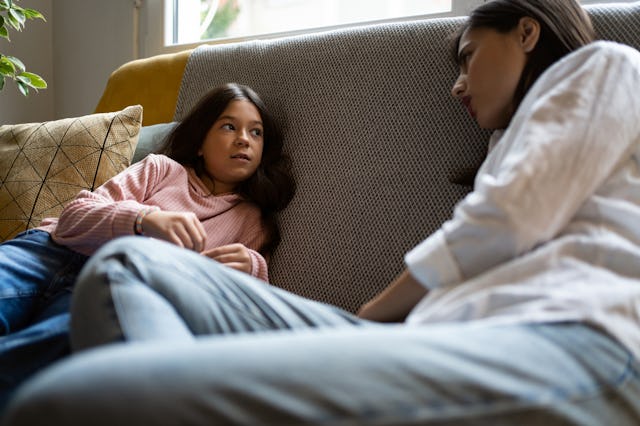How Do You Explain Death To Your Kid When You’re An Atheist?
Advice on having the inevitable death convo, straight from atheist parents who’ve been there.

Where do we go when we die? What happens to our bodies, our souls, or our essence? Almost every religion has an answer to this age-old question. But what if you don't subscribe to a religion? Parents who don't believe in a god or gods might have difficulty answering that question — and kids ask all the questions. So how, exactly, can you comfort your kid over the death of someone special? If you don't believe in heaven, do you still tell your kid that Grandpa is in a better place?
It's tricky to discuss death and dying with children, whether you add in religion or leave it out. A death in the family will surely be a traumatic experience for any kid — especially if it's someone close to them. Without streets of gold and rainbow bridges, you might not know what to say about death when your little one comes asking.
Still, what happens to us after we die is a pretty big question that needs a well-thought-out answer… and that answer depends on the parent. There are some truly lovely answers out there, though. If you're at or close to this crossroads conversation with your kid, keep reading for more insight on what to say.
"Nothing happens."
Some atheists wonder if "what happens after we die" might be an unnecessary consideration altogether. Movies end. Games end. Songs end. There isn't always a follow-up... and that's OK.
"Death is a natural process, and it comes to everyone at some point," says Grace L., a hospice nurse in Tampa, Florida, with three kids. "Sometimes it comes before people are ready for it, but even then, we don't have to be scared; there are doctors and nurses and doulas to help us through times like that. We live our life safely and happily, knowing full well that one day it will end, and that's OK. And I definitely believe we just die and there's nothing more, and my kids have never taken issue with this reality or perspective."
Another mom, Francez C., from Cincinnati, Ohio, agrees. Her advice o what to say and do when it's time for this convo? "The body stopped working because of sickness or an accident. People get together to share memories of the deceased. You just stop at the 'they were buried/cremated.' There have been no questions about what happens after we die, but if they ask, I would just say I don't know."
Laura B., from Eastern Ohio, says that younger kids who aren't raised in religious homes don't really consider an "after" because they haven't been taught about one. "We talk about how the person was super old, in a tragic accident, or had a specific illness (so they don't think they will die with every cold or flu]. Then how they are buried in a cemetery where the living people can go visit their graves to help remember them. At five and eight, they've never asked what happens after the body is buried or thought to ask where we go after we die because they have no clue that other people believe in some sort of afterlife of any kind."
"We return our energy to the earth."
Many atheist parents find that bringing the subject back to nature can help.
"I always look at things from the perspective of energy cannot be created nor destroyed," shares Kerry M., a mom from Salem, Massachusetts. "Once someone dies, their energy lives on in nature, and their memory lives on with us. Every person, plant, and animal alive today is here because other people in the past died."
While this feels beautiful in its cyclical nature, it's also incredibly scientific. Think of how dead plants turn into compost, which then feeds new plants and gives them life.
"We live on in our loved ones' dreams."
Another beautiful way you can talk about death without bringing in a glorious representation of an afterlife? Talking about how our spirit lives on in our loved ones' dreams.
"I believe that after we die our energy gets absorbed back into the world," shared another mom. "More specifically, into our loved ones. Dreams are where we go to live on. Our energy finds a way into our loved ones and into their dreams. And then, when they die, the cycle continues. This is why dreams are hard to interpret, I think. "Heaven" is just us living on inside the ones we love."
"We leave behind our memories and global contributions."
"I taught my girls that when you die, you "live on" in two very important ways," says Morgan P., from Fort Collins, Colorado. "First, a loved one continues to live in our memories and in the stories we share with others. Most importantly, however, we live on through the impact we have on the world and the good we leave behind. The things we do now (good or bad), while living, can last a lifetime."
This is not only a solid way to honor someone who has passed away and give your kids something sweet to hold on to, but it's also a great way to raise kids who want to do good and leave behind a good, lasting impact on the world around them.
This article was originally published on